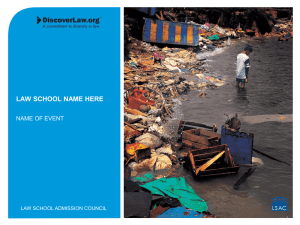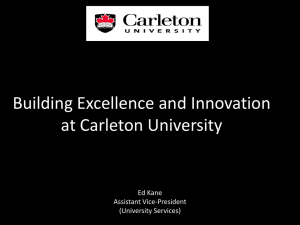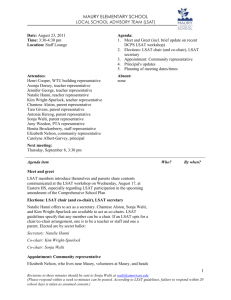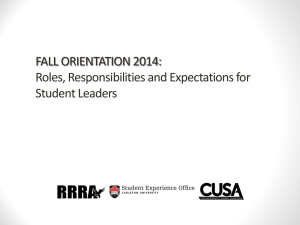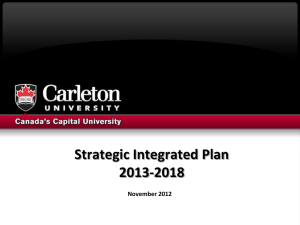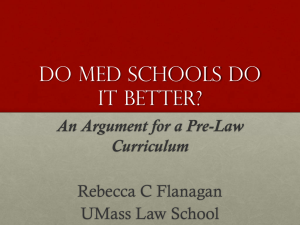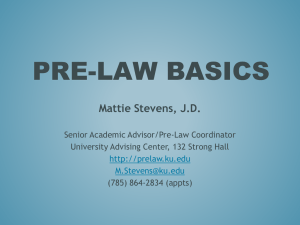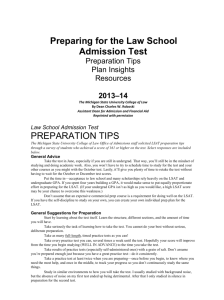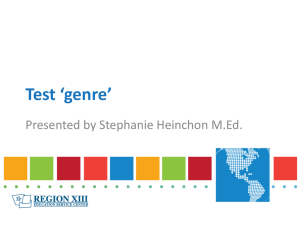Law School Guide 2014-15
advertisement
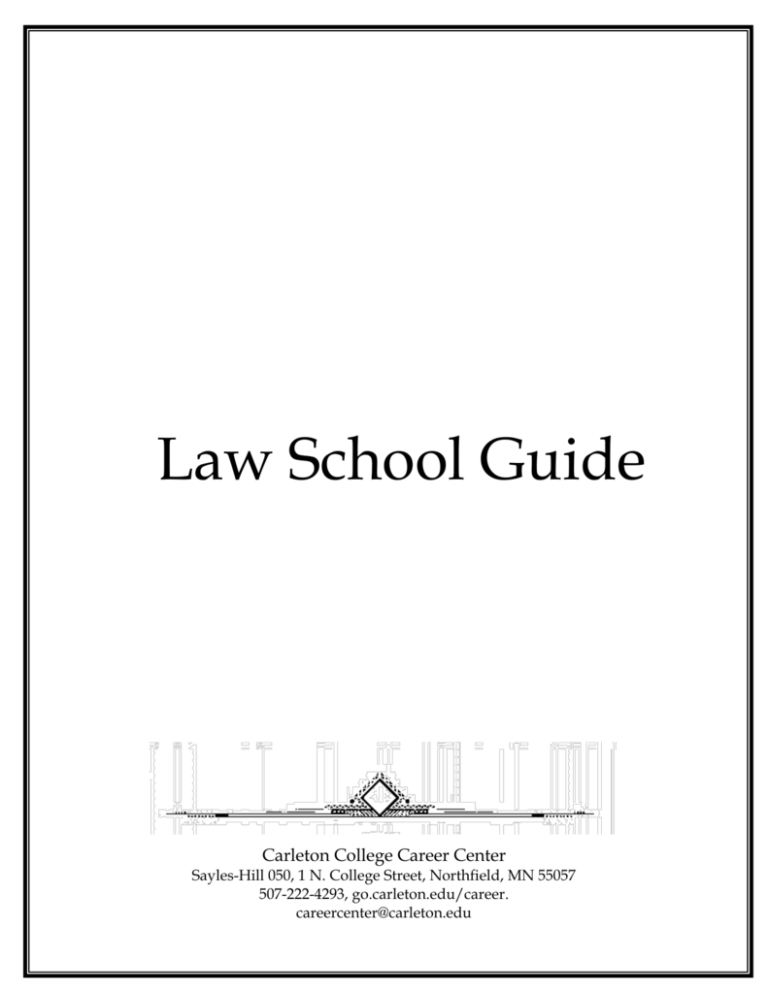
Law School Guide Carleton College Career Center Sayles-Hill 050, 1 N. College Street, Northfield, MN 55057 507-222-4293, go.carleton.edu/career. careercenter@carleton.edu I:\Departments\CARC\CARC-Shared\PreLaw\Law Guide Revised 9/14 1 TA B L E O F C O N T E N T S FOREWORD………………………………………………………………………………………………..3 CHECKLIST FOR THE CARLETON PRELAW STUDENT ....................................................................4 I. PREPARATION FOR LAW SCHOOL ....................................................................................................5 Undergraduate Courses .................................................................................................................................5 Extracurricular Activities ..............................................................................................................................5 Internships and Career Exploration ..............................................................................................................5 II. APPLICATION TO LAW SCHOOL: LSAT AND LSDAS ...................................................................6 The LSAT .....................................................................................................................................................6 Arrangements for Taking the LSAT .............................................................................................................6 Preparing for the LSAT ................................................................................................................................6 Strategies for Taking the Test .......................................................................................................................7 Retaking the LSAT .......................................................................................................................................7 Credential Assembly Service (CAS) ............................................................................................................7 Fee Waivers for LSAT and CAS ..................................................................................................................7 LSAC WebPage for Forms, Publications, General Information ...................................................................7 III. APPLICATION TO LAW SCHOOL: CHOOSING LAW SCHOOLS .................................................8 Official Guide to U.S. Law Schools .............................................................................................................8 Types of Schools ..........................................................................................................................................8 Mentor Externships, 30 Minutes, Print and Online Resources, Alumni Reports, etc...…………………….9 Law School Representatives .........................................................................................................................9 Joint-Degree Programs .................................................................................................................................9 IV. APPLICATION TO LAW SCHOOL: THE PROCESS OF APPLICATION .....................................10 When to Submit Your Application .............................................................................................................10 Recommendations ......................................................................................................................................10 Personal Statements ....................................................................................................................................11 Interviews ...................................................................................................................................................11 Financial Aid ...............................................................................................................................................11 Minority Admissions ..................................................................................................................................11 Waiting a year .............................................................................................................................................11 V. AN ALTERNATIVE ROUTE TO LAW SCHOOL: COLUMBIA 3-3 ...............................................12 VI. AFTER LAW SCHOOL: ADMISSION TO THE BAR ......................................................................12 I:\Departments\CARC\CARC-Shared\PreLaw\Law Guide Revised 9/14 2 Foreword We hope this guide will be helpful in answering your basic questions about preparing for and applying to law school. The best prelaw education is a rigorous liberal arts education. You won’t find a “pre-law” major at Carleton. In fact, most law schools generally discourage such programs. Any Carleton major can be a great background for someone considering a career in law. We work with students in all four years who are exploring the possibility of going to law school, or with students who are certain that law school is in their future. We will work with you on ways to test your law interests first-hand through information sessions, 30 Minutes consultations with alumni, networking, and other opportunities. We can also work with you on timelines, testing, personal statements, and other application processes. We urge you to take full advantage of all of Carleton's resources—staff, online and print. You are encouraged to browse the materials in the Career Center which include the Official Guide to U.S. Law Schools, and review online resources such as the Alumni Directory (go.carleton.edu/alumni/directory), as well as other resources on law schools and the legal profession. Also, check this link for more information: http://apps.carleton.edu/career/students/postgrad/law_med. To schedule an appointment, simply call x4293 or stop by the Career Center in lower Sayles. Our best wishes to you as you plan for and pursue your post-Carleton goals. Erin Chamlee, Program Director, Pre-Law Advisor I:\Departments\CARC\CARC-Shared\PreLaw\Law Guide Revised 9/14 3 CHECKLIST FOR THE CARLETON PRELAW STUDENT Freshman and Sophomore (and Junior) Years: Register in The Tunnel (https://login.carleton.edu/idp/Authn/MCB) so you are on the PreLaw interest list (Click on the Profile > Personal tab. At the bottom of the page, click on ‘Legal Professions’ in the Specific Job Interest section); you’ll automatically receive relevant information and opportunities Decide if either a career in law or a career in another area for which obtaining a JD may be an asset (e.g., politics, government, public policy, etc.) is right for you. Explore opportunities through 30 Minutes meetings, internships or externships (http://apps.carleton.edu/campus/career/) Take advantage of opportunities to do informational interviews, shadowing, volunteering, or individual advising with alumni working in law or attending law school Pursue summer internship and other experiential learning positions with law and policy related organizations Junior Year - Fall Term: Register in The Tunnel if you have not already done so. (see above for instructions) If you are interested in the Columbia 3-3 or similar programs, be sure to consult with the career center right at the beginning of junior year Junior Year - Spring Term: Register for the LSAT and begin LSAT preparation Watch for announcements about the information meeting for prelaw juniors Summer before Senior Year: Request faculty recommendations; set up file with the Credential Assembly Service (CAS) Browse in the Official Guide to U.S. Law Schools (officialguide.lsac.org) Prepare resume of your academic work, work experiences, and extracurricular activities Review law school websites for information on the application process Take LSAT practice exams Senior Year - Fall Term: Take the LSAT Meet with pre-law advisor for planning session. For appointments, contact the Career Center or call x4293 Attend information sessions and tabling visits on campus with potential law schools Complete CAS requirements (request transcripts, etc.) Complete and submit your applications as early as possible Senior Year - Later: Apply for financial aid Ask Carleton Registrar’s Office to send winter term grades (if better or like previous GPA, or if required); have other appropriate persons send in information about honors, etc. If you have not been notified that your application has been received, write or call admissions offices Keep the Career Center informed about your application decisions I:\Departments\CARC\CARC-Shared\PreLaw\Law Guide Revised 9/14 4 I. PREPARATION FOR LAW SCHOOL Law schools generally discourage a specific undergraduate prelaw major. The best prelaw education is a rigorous, well balanced liberal arts education. This can be achieved in almost any major. Law school admissions committees typically look for diversity in majors just as they seek diversity in geographic and cultural backgrounds. Your choice of major need not be influenced by your plans for law school. Whatever your major, however, be sure to work on the basic skills of the legal profession: research: devising strategies to find, compile, and categorize information verbal analysis: interpreting data and constructing arguments articulation: clear and persuasive writing and public speaking quantitative analysis and practical logic: the ability to work with numbers, tables/graphs, and logic Problem solving: assessing complex matters and developing and implementing creative and practical solutions In addition, you should acquire as much knowledge as possible about society, culture, and politics in multicultural America and the world in the past and present. It is vital that you concern yourself with questions of personal and social ethics, whether through course work or in less formal ways. Undergraduate Courses: While there are no specifically required courses, your schedule should include as many courses as possible requiring analytical writing, oral analysis, research, and some significant quantitative work (e.g., mathematics, natural science, and statistics-oriented social science). Since many students are not frequently exposed to the kind of logic problems that occur on the LSAT and in law school courses, PHIL 210 (Logic) may be helpful to anyone not majoring in Philosophy. Students may also find law-related courses such as The American Courts and Constitutional Law useful to gain some experience in legal reasoning. It is unwise to take more than a few courses pass/fail. Exceptions are courses that stress more technical skills or artistic performance such as music lessons, studio art, and even basic foreign language. Too many ungraded credits leave the impression that you are hiding part of your grade record. DRP's should be used sparingly when you really need them. There is no need to worry about one or two DRP's. Extracurricular Activities: While not a primary factor in law school admissions decisions, the importance of extracurricular collegiate experiences, internships, off-campus experiential educational and employment experiences cannot be discounted. These can be important, distinguishing factors among many highly qualified applicants, particularly (1) at the highly selective national and selective regional laws schools, and (2) for candidates whose GPA and/or LSAT score make them borderline for applicants for a particular school or type of schools. Moreover, these experiences undertaken during a student's undergraduate years and/or during any "gap" year(s) will be important to employers who are considering law school graduates for summer and permanent employment. Internships and Career Exploration: In order to have a clear understanding of the legal profession, you should participate in an internship in a law-related setting and Career Center programs such as Carleton Scholars, 30 Minutes, or Mentor Externships. There is no substitute for this kind of insight into a profession. These experiences are invaluable in making an informed decision about pursuing a career in law. Look for law-related internships or externships in The Tunnel, Carleton’s internship and job database, at http://apps.carleton.edu/career/students/find_jobs/resources/tunnel/. Also review career exploration, internship, and full-time opportunities in the Spotlight on Careers – Law resource, which is accessible in The Tunnel (see Shortcuts on the right-hand side of the page). I:\Departments\CARC\CARC-Shared\PreLaw\Law Guide Revised 9/14 5 II. APPLICATION TO LAW SCHOOL: LSAT AND CAS The LSAT: Practically all law schools require that you take the Law School Admissions Test. The test is given four times a year (mid-June, early October or late September, early December, February). Visit www.LSAC.org for information on how to register for the test. The LSAT consists of five 35-minute sections plus a 30-minute Writing Sample. Among the five sections, there will be at least one each testing the following skills: reading comprehension (based on texts from various disciplines), analytical reasoning (logical puzzles and games), and at least two parts testing logical reasoning (analysis of arguments). The Writing Sample is not scored, but is sometimes used by law schools to judge your writing in a controlled situation. Test scores from range from 120 to 180. Arrangements for Taking the LSAT: LSAT/CAS registration packets, application forms, and instructions are available online at http://www.lsac.org/jd/lsat/registration-methods Locally, all four tests are given at the University of Minnesota, William Mitchell College of Law, University of St. Thomas and Bethel University. Many students take the test in August or October of the year they are applying to law school, so that their admissions files will be complete by November. However, to be as competitive as possible, we recommend that students apply to law schools by October 1, and thus should take the test in August or during the year prior to the year in which you intend to apply. The most important consideration in choosing a test date is, however, whether it will permit you sufficient time to prepare. You must not walk into the test without a clear sense of the kinds of questions asked on the test. You do not need to apply to law school immediately after you take the test. Your score will be good for five years. It is recommended that, if possible, you take the LSAT when you are “test savvy,” such as a time soon after you’ve graduated. Preparing for the LSAT: The importance of the LSAT and your preparation for it cannot be understated. Law school admission primarily is based on your GPA and LSAT score; thus you should pursue the preparation path that best enables you to maximize your LSAT performance. Generally you can assume that your LSAT will not be wildly different from your SAT percentile score. Many law schools regard the LSAT score as the best indicator of your performance in law school. Since speed is essential in the LSAT, you should be familiar enough with the kinds of questions asked in the test so that you can read the general instructions and even some of the individual questions rapidly. At a minimum you should work through many sample questions and a couple of sample tests before your test date. Any score will become part of your record for five years. Although some schools will average the scores from multiple testing dates, most schools now will consider the highest score only. Some students find it perfectly sufficient to review the sample questions and practice test supplied in the LSAT/CAS website, supplemented with The Official LSAT SuperPrep book, published by the Law School Admissions Services. The kit includes three complete PrepTests, a guide to LSAT logic, explanations for every item in all 3 tests, and sample Comparative Reading questions and explanations. You can order it at www.lsac.org or www.amazon.com. It is essential that you do this kind of preparation thoroughly. You ought to draw up a time plan that will allow you to finish the whole review. If you have questions about particular sections, faculty in the appropriate departments (mainly English, Philosophy, Political Science) can help. Many students have also found commercial preparation courses to be valuable. They can be worthwhile in a few situations. (1) If you are afraid that you will not discipline yourself to maintain a regular schedule of preparation, then the regimen of regular class meetings and assignments will help. (2) If you have a bit of a test-phobia or are just fearful of this test, the group setting and routine of a review course might offer you the necessary assurance and comfort. (3) If this type of standardized test is not your strength and your past performance on such tests (e.g., SAT/ACT) generally is not reflective of your GPA or other academic measures, a commercial course may provide you with the tools and familiarity necessary to maximize your performance. I:\Departments\CARC\CARC-Shared\PreLaw\Law Guide Revised 9/14 6 Strategies for Taking the Test: Since no points are deducted for wrong answers, you should answer all questions, even if you have no time left to consider or even read them. Devise a strategy for guessing on such questions before you take the test. Experimental sections sometimes throw students off. Since you do not know which of the five sections will not count, you must work through all of them as well as you can. But do not allow yourself to be shaken by a particularly nasty section, which might be quite different from anything you have seen before. Retaking the LSAT: Historically, it was not wise to retake the LSAT (unless you believe you could do substantially better on the second try) because most law schools averaged an applicant's LSAT scores. Today, however, most law schools will consider an applicant's highest score. If you think that you can materially improve your score, you might consider taking the LSAT more than once. However, we recommend speaking with someone prior to going this route. Credential Assembly Service (CAS): Most law schools require applicants to register with the Credential Assembly Service (CAS). CAS will supply you with standardized transcript requests to be submitted to the registrars of all colleges and universities where you have taken any courses. CAS then summarizes and standardizes your grades, with cumulative averages for each academic year. Grades are counted the same way as at Carleton, except that clearly interpretable ungraded designations such as NC are counted like their grade equivalent (e.g., NC=F). P's are not calculated in, but simply listed as ungraded credits. While a few ungraded credits are considered normal by the admissions officers, too many P's leave a poor impression because they appear to hide too much of the grade record. CAS sends the grade summary, together with copies of transcripts and LSAT scores, to the law schools designated by you. You register for the CAS on the same form as registration for the LSAT, but you should register for the CAS only in the year when you apply to law school. It is valid only for that year and will have to be renewed if you apply at a later time. Fee Waivers for LSAT and CAS: If you can show serious financial need, your registration fees for both LSAT and CAS may be waived. Fee waiver application forms are available online. The completed form must be submitted to the CAS, along with the registration form and copies of the most recent federal tax or Law School Admissions Council (LSAC) nonfiler forms, eight to nine weeks before the test date. For fee waivers for the application fees at law schools, you need to directly contact the law school admissions officer of the particular school. Be sure to start this process early. LSAC WebPage for Forms, Publications, General Information: http://www.lsac.org/ I:\Departments\CARC\CARC-Shared\PreLaw\Law Guide Revised 9/14 7 III. APPLICATION TO LAW SCHOOL: CHOOSING LAW SCHOOLS Official Guide to U.S. Law Schools: The first source to consult on law schools is the Official Guide to U.S. Law Schools, official guide of the Law School Admission Council and the Association of American Law Schools. The Official Guide contains two-page descriptions of all law schools approved by the American Bar Association, the only law schools you should consider. Unapproved law schools usually (1) prevent you from taking the bar examination later or at least restrict you severely, and (2) significantly limit your ability for future employment in the legal field. The Official Guide to U.S. Law Schools lists admissions profiles and contact information for the admissions offices. A copy of the Official Guide (officialguide.lsac.org) is available for reference at the Career Center and in Gould Library. Types of Schools: Law schools generally can be divided into four categories: (1) highly selective, national schools; (2) regional schools with varying levels of selectivity; (3) local schools; and (4) schools with specialized programs. With the exception of the specialized programs, the basic law school curriculum does not vary from school to school and your coursework will not likely determine the type of legal career or the area in law in which you may specialize following graduation from law school. The national, regional and local schools within each category and between categories vary tremendously in size, faculty/student ration, number and quality of course offerings in specialized areas, location and setting, and vocational related extracurriculars (e.g., clinics, journals, moot courts, etc.), and like your experience choosing Carleton, many schools will have distinctive characters and learning environments that will impact your decision. However, in addition to selecting an academic atmosphere that accommodates your interests and strengths, a critical factor in selecting a law school should be the employment and career opportunities that a particular school affords its graduates. Your school choice will have a major impact on the career opportunities that will be available to you immediately upon graduation. The post-graduate employment process is highly structured for law students in their second and third years. During second year, employers (firms, businesses, governmental entities, and public interest organizations) interview second year students on and off campus for summer positions following their second year. (The key factors to employment decisions will be a student's first-year law-school grades (the vocational related extracurricular opportunities available to first year law students are very limited), undergraduate academic and extracurricular record, gap year(s) employment and other experience, and internship/experiential endeavors during the undergraduate years.) Generally, these summer positions are the stepping stones to permanent positions with that employer, as well as others. During the third year, students secure permanent, post-graduate positions with their summer employers and others, and also begin the process of securing coveted one to two-year judicial clerkships. (Most employers view judicial clerkships as extremely valuable endeavors and hold open permanent positions for graduates to assume once their clerkship is complete.) As a result of this process and depending on the law school attended and a particular student's law school record, work experience and undergraduate academic and extracurricular achievements/experiences, many (and at a number of law schools, most) law students have their post-graduate positions lined up prior to graduation. As a general principle, students graduating from the highly selective, national schools (including many of the top ranked private schools and a limited number of State schools) have the most employment options, both nationally and regionally and with all categories of employers. The major exception to this rule, is that within a particular region, the graduates from the top regional public and private law schools are competitive in their regional markets with graduates from the top national schools. Thus, for example, a student graduating in the top third of her class at George Washington School of Law is competitive in the Washington, DC market with the students graduating from Harvard or Georgetown. The George Washington graduate, however, generally will not be competitive in markets outside of the DC area with graduates from the selective, national schools or with graduates from the relevant regional schools. Local schools and schools offering specialized programs (e.g., Pace Law School's environmental program), are the most limiting with respect to post-graduate employment opportunities, but may be appropriate if a student is certain that she wants to pursue a career in the locality or the specialty, as the case may be, and her undergraduate record precludes admission to a national or regional school. I:\Departments\CARC\CARC-Shared\PreLaw\Law Guide Revised 9/14 8 Types of Schools: (continued) It is important that you apply to a number of schools with a range of competitiveness and which provide you with the opportunities to pursue your career objectives following your law school graduation. Once you have your LSAT score, you should be able to select a pool of appropriate schools. State schools generally give some preference to state residents. Reciprocity for in-state tuition between some states (e.g., Minnesota and Wisconsin) does not apply to any advantages given to state residents in the admissions process. Because of the critical importance of the caliber and location of the law school you attend with respect to post-graduate career opportunities, a student whose grades or LSAT scores place her at the margin or just below threshold admission numbers may want to consider a gap year experience. Students can often increase the caliber of school at which they can secure admission by pursuing consequential employment or educational opportunities during one or more gap years following graduation from Carleton. Mentor Externships, 30 Minutes, Print and Online Resources, Alumni Reports, etc.: The Career Center has a collection of print materials (which you can check out) about getting into law school, LSAT prep, and being a paralegal. To research specific law schools and to search for joint degree programs, visit www.petersons.com. You can also learn about being a paralegal from alums (go.carleton.edu/alumni/directory). You can obtain contact information from alums in law school and alums practicing in various areas of law by taking advantage of 30 Minute visits with attorneys in the Career Center, using the Alumni Directory, found on the Career Center website or at go.carleton.edu/alumni/directory. Using these resources as you prepare to apply to law school or seek summer or winter break opportunities such as Externships can be invaluable. Law School Representatives: Representatives from law schools visit Carleton periodically, often in the fall, to present information sessions. Be sure to attend information sessions and talk to a few of these representatives, even if you are not necessarily interested in the particular law school. These admissions representatives generally have a wealth of good knowledge to share regarding law school and the application process. Joint-Degree Programs: Many law schools and graduate schools offer programs leading simultaneously to a JD degree and a masters degree in another field, such as a JD/MBA, a JD/Master of Public Policy, or a JD/Master of Public Health. Even if the school in which you are interested does not have a formally established joint degree program between the law school and a particular graduate program, many schools will be willing to consider developing a special joint program, provided that you can gain admission to both programs independently. Joint degree programs vary in how the coursework in each program is scheduled but often the programs are structured so that certain courses count for both programs and a student can graduate in a shorter period of time than if she completed the degrees separately. Although it should not be the reason for applying to joint program, we are aware of students who have improved the caliber of law school to which they obtained admission by applying to a joint degree program. I:\Departments\CARC\CARC-Shared\PreLaw\Law Guide Revised 9/14 9 IV. APPLICATION TO LAW SCHOOL: THE PROCESS OF APPLICATION To obtain application materials, visit the websites of all the law schools you want to apply to late in the summer or early in the fall. If you are interested in financial aid information, be sure to note this in your communication. Addresses are listed in the Official Guide to U.S. Law Schools (see page 8). If you are waiting for the fall LSAT score, you might want to have some of the applications materials ready so you have them to complete at the start of winter break. Be sure your application is error-free. When to Submit Your Application: The earliest law school deadlines are mid-January; many are early or mid-February. More schools are offering an Early Decision/Action option for applications, though the number is still relatively small. Be sure to check if this option is available, as deadlines can be as early as November, and may require you to have taken the LSAT by the previous June. Because most law schools begin reviewing files and admitting students in November, you gain a significant advantage if your application is in by November 1, and ideally by October 1. Remember that your application is not complete until all parts have been received: application form, fee, references, and LSAT/CAS reports. It is your responsibility to insure that all items reach the school. For safety, always have your material verified online as received. Law schools generally notify you when your application is complete. If you have not heard after a reasonable amount of time, check with the law school. Recommendations: Most law schools require two (sometimes three) letters of recommendation. You should tell your recommenders when you expect to have your application in and when you would like their recommendation to be completed. At least one of your references should be from a faculty member in your major. Others may come from other faculty or persons who know your work in other contexts, which are relevant to the study or practice of law. In the case of outside references in particular, be sure to ask only those persons who really know your work; do not ask people simply because they are famous. Admissions officers are not impressed by fame, but by specificity and completeness of recommendations. Since completeness and specificity of evidence are essential for a good recommendation, be sure to ask one of your recommenders (the one who knows your work most intimately - perhaps your advisor) to write about all aspects of your academic and extracurricular work. Specifically, ask her/him to explain your transcript as fully as possible - particularly difficult courses at Carleton, patterns of strengths and weaknesses, reasons for particular problems. This means that you need to supply that person with a copy of your transcript, your own evaluation of your strengths, weaknesses, reasons for lapses, your résumé summarizing your relevant experiences, and your application essays, and any other information that provides your recommender with a clear understanding as to why you are applying to law school and where you hope to go. The information that you can provide your recommender, the better they can advocate for you. Some law schools require a dean's recommendation. Contact the Dean of Students Office and be sure to tell the staff member by what date you would like the recommendation to be mailed. Generally you should not submit more than three recommendations to any one law school. Overloading your file is of no advantage. If a law school does not require references, send them anyway. In borderline cases, such schools do look for recommendations. Do not send any references only if the law school specifically requests that you not send any references before they ask for them. Candor and Truthfulness: It is essential that you be absolutely truthful and candid on your law school application, including revealing such matters as disciplinary actions and criminal convictions, if asked. Even a criminal conviction need not disqualify you from attending law school or becoming a lawyer, but lawyers are held to high standards of honesty, and lying on an application may hurt your chances of being admitted to the bar. I:\Departments\CARC\CARC-Shared\PreLaw\Law Guide Revised 9/14 10 Personal Statements: Many schools ask for a personal essay. This is the toughest part of the application. No one finds it easy to write about ourselves without either boasting or understating our capabilities. Obviously, you want to be as honest as possible without overemphasizing your weaknesses. It usually helps to focus your essay on a specific issue or event and build your arguments on that. Be sure that you present a clearly organized argument, and write concisely without flowery verbiage. The admissions committees use your essay to judge your ability to express yourself clearly and persuasively. They are also looking for evidence that you have given thoughtful consideration to and can explain your choice to attend law school. It is best to ask someone to read your essay and give you an honest critique. This can be a member of the faculty, staff in the Career Center, or trusted mentor. Finally, some law schools require multiple essays. Unless the question is "Why Law School," consider writing about something other than that or tell a story that shows why you are interested in law. Interviews: Interviews are generally not encouraged by law schools, though a few schools do offer interviews. However, you may find it useful to visit schools you are considering, sit in on some classes, and drop by the admissions office for a talk. If you call ahead, be sure to mention that you are from Carleton; it often helps. If you are asked for an interview, you may contact the Career Center (x4293) to schedule a practice interview and to receive coaching about the interview/application process. Financial Aid: Scholarship grants are not common in law schools. More commonly, schools will support their students in applying for Guaranteed Student Loans or other loan aid. Increasingly law schools have been offering special merit scholarships, usually named after a prominent donor, in order to attract top students. Some of the most prestigious of these are the Root-Tilden at New York University, the Patrick Wilson at Vanderbilt, and Morehead Fellowships at North Carolina, but there are others, which will be listed in the catalogs. For students from Minnesota or those planning to go to a Minnesota law school, there is the Blackmun Scholarship. Be sure to inquire if you believe you might qualify for merit scholarships. There are a number of assistance programs for minority students both in individual law schools and through LSAC. Note the program of the Council on Legal Education Opportunity (www.cleoscholars.com). Minority Admissions: Most law schools, including all the more prestigious national and regional schools, actively seek strong minority students. Especially in the case of the most underrepresented minorities, schools will want to admit an applicant if they believe that she/he can succeed at the school. Solid academic performance at Carleton is strong evidence that you will do solid work at most law schools. For further information, review the LSAC brochure Minority Students and Law School online. Deferral, "Gap" Year(s) and Transfer : Some schools grant deferred admission if you can present good reasons for deferment after acceptance, but many schools accept applications only during the year before intended enrollment. For several reasons it is best to apply later if you are planning to take some time off between Carleton and law school. First, your GPA is likely to be higher if it includes your whole senior year. Second, if you have any uncertainty as to whether law school or a potential legal career is the right direction for you, you can use the time immediately after Carleton to pursue employment or other opportunities that will help you make a more informed decision. Attending law school is a serious commitment of time and resources, and is a very intense educational experience; thus, any uncertainty about whether you should go to law school or whether having a JD is an important credential for your career objectives should be resolved before applying and enrolling. Third, depending on what you do and how well you do it during one or more "gap" year(s), that experience can positively impact (even significantly) your ability to gain admission to a more selective law school than you could have based on your undergraduate record alone. Schools vary in the number and circumstances under which they accept transfer students for their second/third years of law school, but just like the creative and effective use of an impressive Gap Year experience can improve one's ability to secure admission to a more selective school, a transfer after an excellent first year can be an effective way to secure a JD from a more selective school. Georgetown is one example of a highly selective, national law school that accepts a large number of transfer students. I:\Departments\CARC\CARC-Shared\PreLaw\Law Guide Revised 9/14 11 V. AN ALTERNATIVE ROUTE TO LAW SCHOOL: COLUMBIA 3-3 If you believe that you would profit from a shortened 6-year combined program of college and law school, culminating in a BA and JD degree, you might want to consider the Columbia 3-3 program ("AILE"). This program requires you to fulfill all basic Carleton requirements (writing requirement, foreign language, distribution, physical education) and your major (including comps), but you need no more total credits than are required by the end of your junior year. You may fulfill course requirements for your major during your second and third years of law school through Columbia University's graduate school. You will need to negotiate with your department how you can meet these requirements and how you will complete your comps. Obviously, you have to be admitted by Columbia University Law School through their AILE Program. If you are interested in this option, be sure to contact the Prelaw Advisor at the start of your junior year. You will need to take the LSAT the following December or February. Columbia's admission decision for this program is very late in the spring - sometime in May. Carleton is one of some 25 selective liberal arts colleges from which two to three students can be admitted by Columbia in any one year. A few other law schools are willing to set up similar programs on an individual basis. For more information, see the Career Center. VI. AFTER LAW SCHOOL: ADMISSION TO THE BAR In order to practice law, you will be need to be licensed by a state. The procedure varies from state to state (and the federal judicial system). Usually it entails passing a state bar examination and a moral character assessment. You need to think about your later admission to the bar at this point for two reasons. 1. Your moral character assessment will obviously be based on your conduct during your college and law school years. You may well need someone from your undergraduate school to write a character reference for you. 2. Some states require you to make a "declaration of intention to study law" either right before or immediately after enrolling in law school. I:\Departments\CARC\CARC-Shared\PreLaw\Law Guide Revised 9/14 12
